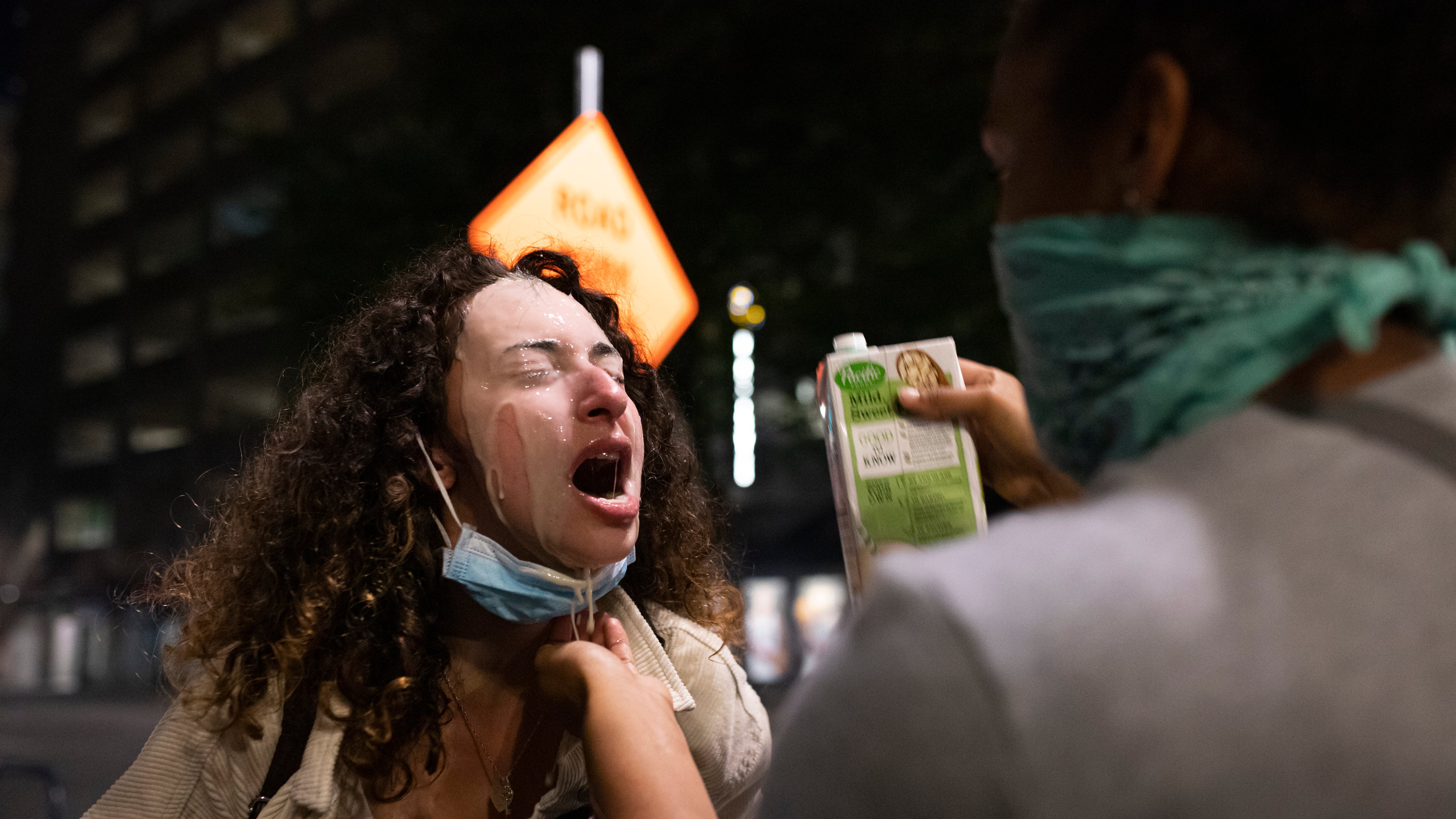An uprising in the streets of Portland over the past two weeks was intended to draw attention to police violence against black people. It's succeeding—in part because police repeatedly deployed gas, smoke and other military-grade crowd control devices in quantities rarely seen even in this fractious city. The images of police spraying and beating demonstrators alarmed much of the city. More than 2,300 people filed complaints with the city's Independent Police Review in a single week. At least six protesters and a nonprofit have sued the city. These three weapons are drawing the most scrutiny and backlash.

TEAR GAS, OR CS GAS
What is it? A potent, aerosolized chemical agent that is typically sprayed out of a canister.
Why is it used? To disperse large crowds of people by causing intense burning in the eyes, throat, lungs, and on the skin..
What could go wrong? Exposure to the gas can cause coughing or even retching, and the effects get worse the harder someone breathes. So protesters who've been gassed and run away from the source may begin to cough even more.
Who wants rid of it? Worldwide, many people. The Geneva Conventions designated it a chemical warfare agent after World War I, and in 1993, the nations who signed those treaties banned the use of gas during war. In Portland, numerous public officials have called for its ban, including City Commissioners Jo Ann Hardesty and Chloe Eudaly. Mayor Ted Wheeler told police last week to use it only if they felt their safety was threatened.
Who's suing over it? On June 5, a black activist group called Don't Shoot Portland sued the city of Portland in federal court to halt the use of tear gas on protesters. Teressa Raiford, founder of Don't Shoot Portland and a former mayoral candidate, decried the use of CS gas: "We're out screaming for justice for Black people and asking the state to stop its violence against us," Raiford said, "and the city responds by using tear gas when we're in the middle of a pandemic of respiratory disease."
A Portland couple named Andy and Samira Green have also sued. The Greens say they were sprayed with tear gas shortly after 9 pm on June 2. The two now suffer from migraines, coughing and fear, says the lawsuit filed in Multnomah County Circuit Court on June 8. Samira Green is pregnant.

FLASH-BANGS
What are they? Explosive devices, often ejected from a grenade launcher.
Why are they used? To disorient people with loud bangs and bright flashes, and, ultimately, to disperse crowds.
What could go wrong? If used as intended, police aim the devices in the air, where they detonate. But activists allege police sometimes aim them directly at protesters. Getting hit with a flash-bang, also called a "concussion grenade," can be fatal. A ProPublica investigation found that between 2000 and 2015, at least 50 Americans were maimed or killed by police use of flash-bangs. A Portlander named Anthony Cantu suffered a traumatic brain injury after getting hit with one during a 2018 protest. His attorneys argued that if it weren't for his thick bicycle helmet, he probably would have died.
Who wants rid of them? They're very common in police departments nationwide. The Portland Police Bureau said it would halt the use of flash-bangs in 2018 pending an internal review of the dangers they posed to protesters. But a bureau representative now tells WW the devices deployed this week are different from the ones used in 2018.
Who's suing over them? Julia Leggett filed a lawsuit against the city in Multnomah County Circuit Court on June 7 after a concussion grenade exploded near her right leg while she was walking away from police during a June 5 protest. "The grenade exploded near Ms. Leggett's right leg, shredding her pants," the lawsuit says, "producing hematoma, and requiring immediate medical attention, causing her pain, discomfort and distress."

RUBBER BULLETS
What are they? The name is somewhat of a euphemism. "These kinetic energy (KE) rounds are rarely made of rubber these days, and some even have metal components, just like conventional bullets," Fast Company reported. They are often shot from grenade launchers or modified paintball guns. Don't confuse them with pepper balls, projectiles that are shot from similar weapons but usually cause less severe injury.
Why are they used? To inflict serious pain on someone who poses a threat. Rather than piercing the skin, they're intended to strike with blunt force, but from a distance.
What could go wrong? They can kill or blind someone. More recently, a freelance photographer in Minneapolis was blinded in one eye by a rubber bullet while covering a protest May 29.
Who wants rid of them? Some advocacy groups, like Physicians for Human Rights, have called for rubber bullets to be banned. But they remain common in police departments throughout the United States.
Who's suing over them? Brandon Farley, a conservative videographer who regularly films protests, is suing the city, saying an officer shot him in the knee with a rubber bullet during a June 4 protest. Farley was then sent to the hospital for his injury, the complaints says, which has caused him "pain, discomfort and distress."

